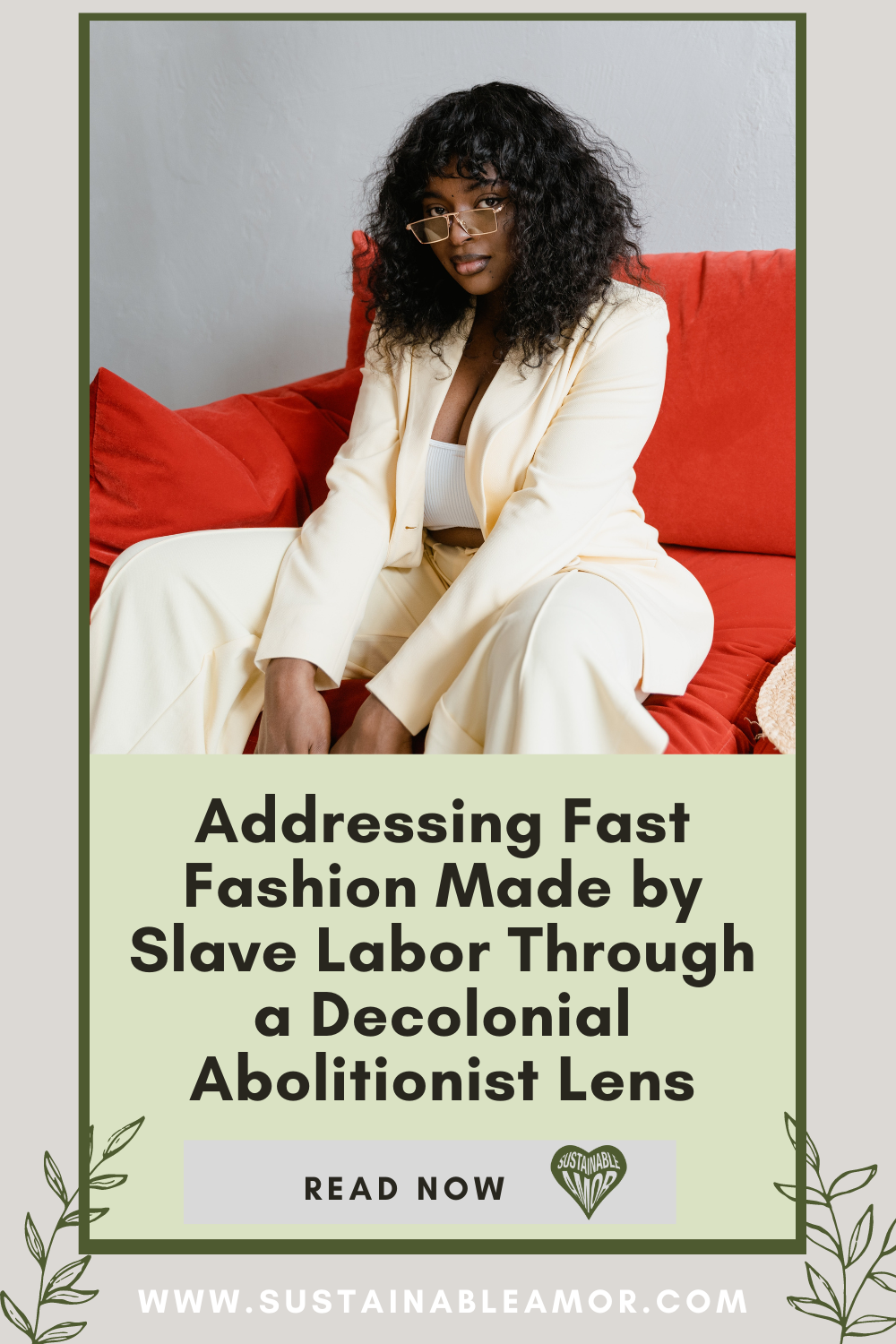Addressing Fast Fashion Made by Slave Labor Through a Decolonial Abolitionist Lens
Fast fashion made by slave labor can be tackled through a decolonial, abolitionist lens by focusing on dismantling systems of oppression and exploitation. It asserts that the fashion industry is linked to systems of colonization, exploitation, and oppression, and that addressing these issues requires a radical and systemic transformation of the industry. It argues that the exploitation of workers, particularly those in the Global South, and the destruction of the environment, are not simply by-products of the industry, but are intrinsic to its operation and are rooted in colonial and imperial histories of exploitation. It challenges conventional notions of "green" and "sustainable" fashion, and instead calls for a radical and transformative approach that prioritizes social and environmental justice, and the empowerment of marginalized communities.
Ethical fashion is not simply a matter of using more sustainable materials or fair labor practices, but must also involve the dismantling of colonial and imperial power relations in the production and consumption of fashion. This involves the recognition and validation of indigenous knowledge and cultural practices, the decolonization of design and fashion education, and the creation of alternative economic models that prioritize community well-being and environmental sustainability. It also means supporting and elevating efforts of individuals and organizations that prioritize ethical production and labor practices that are shifting industry norms towards a more just and equitable future. And to recognize that collective effort towards ethical fashion requires a commitment from both individuals and corporations to create a world free from slavery and exploitation.
Slave Labor & Fast Fashion
Fast fashion is a term used to describe the rapid production and turnover of trendy clothing and accessories. Fast fashion is one of the most profitable industries in the world, but it also has a dark side. The industry relies on low-wage labor, often in developing countries, where workers are exploited and forced to work in dangerous and unhealthy conditions. It deeply relies on slave labor, which is a moral and ethical crisis that affects millions of people around the world.
Garment workers in the fast fashion industry are subjected to inadequate wages, forced to work 12+ hr days, and are subject to physical and verbal abuse. Some workers are even trafficked into the industry and are forced to work against their will. But despite efforts to eradicate slavery and forced labor, these issues persist. As consumers, it’s our responsibility to understand the impact of our purchasing decisions and to demand transparency and ethical practices from the companies we support.
What is Abolitionism?
Abolitionism is a social and political movement that seeks to abolish slavery and forced labor in all its forms. This movement seeks to end the exploitation of vulnerable populations and to promote equality and justice for all people. Abolitionism has a long history, dating back to the 19th century, when activists, including Frederick Douglass and Harriet Tubman, worked tirelessly to abolish slavery in the United States. Today, abolitionism remains an important movement, as slavery and forced labor persist in various forms around the world. From human trafficking to forced labor in supply chains, modern-day slavery is a serious problem that requires our attention and action. Through an abolitionist lens, we can also work towards a future where all people are treated with dignity and respect and slavery in fashion is finally abolished once and for all.
Decolonial Abolitionist Solutions to Fast Fashion’s Slave Labor
Decolonial abolitionism in fashion refers to a critical and political perspective that challenges the legacy of colonialism in the industry, and aims to abolish exploitative systems such as slavery, indentured labor, and sweatshop labor in the production of clothing. It seeks to dismantle the power structures that perpetuate oppression, domination and inequality and reclaim cultural heritage, identities and knowledge. It envisions a fashion industry that is equitable, sustainable, and centered around justice and dignity for all workers and communities.
To move forward towards this vision we need to end slave labor in the fast fashion industry. To do this we need to understand the root causes of slavery and forced labor, such as poverty and lack of access to education, and work to address it holistically. The root causes of forced labor in the fashion industry are complex and interrelated, but some of the key factors include:
1. Poverty: Many workers in the fashion industry come from poverty-stricken areas, where they have limited access to education, job opportunities, and basic resources. This makes them vulnerable to exploitation and forced labor.
2. Lack of regulation: In many countries where the fashion industry operates, there are limited laws and regulations to protect workers' rights and ensure fair wages and working conditions. This creates a conducive environment for exploitation and forced labor.
3. Globalization: The globalization of the fashion industry has led to the decentralization of production and the outsourcing of labor to countries with lower labor costs. This has resulted in a lack of transparency and accountability in the supply chain, making it easier for companies to exploit workers and engage in forced labor.
4. Weak labor protections: In many countries, workers are not protected by strong labor laws and have limited access to legal solutions to exploitation and forced labor. This creates a power imbalance in the workplace and makes it easier for companies to engage in unethical labor practices.
5. Demand for cheap, fast fashion: The demand for fast fashion, characterized by low prices, rapid turnover of trends, and an ever-increasing supply, has created pressure on companies to cut costs and reduce the time to market. This has led to exploitation and forced labor in the supply chain, as companies seek to maintain profits and meet consumer demand.
Addressing these root causes requires systemic changes, including stronger labor laws and protections, better enforcement of existing laws, increased transparency and accountability in the supply chain, and a shift in consumer demand towards ethical fashion.
The fast fashion industry has a dark side, and slave labor is a serious problem that must be addressed. Through a decolonial, abolitionist lens, we can work towards a future where all people are treated with dignity and respect and slavery is finally abolished once and for all. It is up to each and every one of us to take action and make a difference, whether through our consumer choices, activism, or support for organizations working to end slavery and forced labor. Together, we can create a world free from slavery and exploitation.



